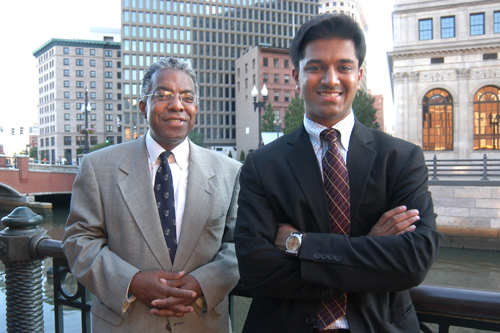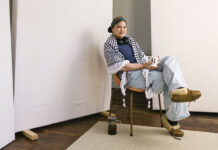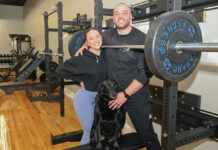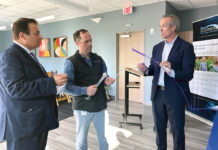
When it comes to the battle of the bulge, Americans are losing the war. More than 66 percent of the nation’s population is overweight; 32 percent are obese.
And even though Rhode Island’s weight problems rank as some of the least severe in the country, the statistics are still alarming: More than 21 percent of the state’s adults and 30 percent of its children are obese, racking up a $305 million annual price tag from afflictions attributed to obesity.
Perhaps no one understands this dire situation better than Rajiv Kumar, a third-year medical student at Brown University who aims to squash the state’s growing obesity epidemic. The 26-year-old founded and serves as chairman of Shape Up Rhode Island, a statewide wellness program based on teamwork and competition.
After nearly five years, Shape Up RI has helped more than 35,000 citizens from the state’s 39 towns and cities get healthier. The program plans to continue its growth and reach 90,000 participants by 2012.
“For the past 20 or 25 years, we’ve seen obesity rise every year in Rhode Island,” Kumar says. “We’d like to see that rise halt and actually begin to decrease. Then we can see the prevalence of diabetes, heart attacks and other diseases start to reverse.”
To get started with Shape Up RI, participants or participants’ employers pony up $20 and sign up for a 12-week spring competition or eight-week summer competition. Five to 11 people – usually friends, family or co-workers – make up each team. All competitors receive a pedometer to count steps, a blue wristband, a logbook and access to an online Team Tracker system. Teams can compete in one, two or all three competitions: Number of pedometer steps logged; number of hours exercised; and number of pounds lost.
Each participant tracks steps, exercise times and weight loss, with one team leader updating data on the Team Tracker system every two weeks. Everyone can check other teams’ statuses via the Team Tracker system. Winners of the competition don’t receive prizes, but virtually everybody comes out a little healthier than when they entered.
“People who join a gym or go on a diet alone – we’re less likely to succeed that way,” Kumar says. “But when we have our social support network around us, they hold us accountable and keep us motivated. We’re much more likely to sustain change.”
Shape Up RI’s success rates validate the strategy. Kumar said that 73 percent of participants finish the competition, a huge number when compared with the completion rate of other wellness programs. Rena Wing, a psychiatrist at Brown University’s Warren Alpert Medical School, led a study published in January that analyzed Shape Up RI’s effectiveness.
“We found that the people who completed the program lost about 7 pounds,” she says. “Thirty percent of them achieved a clinically significant weight loss of about 5 percent of their body weight.” Studies suggest that losing 5 to 10 percent of body mass can reduce the incidence of diabetes by about 50 percent, and Wing said that any weight loss helps lower blood pressure and reduce risk of heart disease and other obesity-related problems.
The program’s popularity has exceeded Kumar’s wildest dreams. He originally designed the weight loss and wellness competition as a fundraiser for Adopt-a-Doctor, a nonprofit he founded with consultant Ray Rickman in 2003 to provide salaries for doctors in some of Africa’s poorest nations. “Before we knew it, the tail was wagging the dog, and we decided this had a life of its own,” Kumar says.
Kumar started Shape Up RI’s pilot program out of his apartment in December 2005, with funding provided by the medical school. His goal was to get 500 participants to sign up. By the time the competition rolled around that spring, almost 1,800 people had registered. Over the next four years, participation grew tremendously, with companies like Blue Cross & Blue Shield of Rhode Island paying for its employees to join. In 2009, 15,000 people joined the program, and the popularity didn’t stop at state lines. To that end, Kumar and classmate Brad Weinberg founded Shape Up the Nation, a program that uses a similar competition-based model at work sites in 26 countries, involving more than 100,000 participants globally.
Though Kumar based the Shape Up RI model on teamwork and competition, the program features year-round, free events open to participants and the general public. This year saw more than 1,200 events, from cooking classes to pilates classes to basketball games to walking events. “We don’t prescribe a certain activity for anyone, we just say go out and be active,” says Colin Murphy, Shape Up RI’s executive director.
In the future, Shape Up RI organizers hope to expand the program to reach different constituencies. This month, Shape Up RI launched a pilot walking competition for fifth graders. By next summer, Shape Up RI hopes to have a program for senior citizens underway. And with a $250,000 grant provided by the Rhode Island Foundation, Shape Up RI plans to implement over the next three years a new outreach program for physicians. Outreach will focus on getting doctors to “prescribe” wellness by providing patients with more educational resources.
Kumar says he’s also working on ways to make the program more accessible to citizens without Internet access, by integrating its Web-based platform into cell phone technology.
At the same time, Kumar plans to return to medical school this February after taking some in off to work on Shape Up RI and complete a research fellowship. After medical school, he hopes to stay in Rhode Island to do his residency and continue to promote a healthier state through Shape Up RI. “It’s not going to happen from one organization or any one person,” Kumar says. “It’s going to be a collective effort.” •











